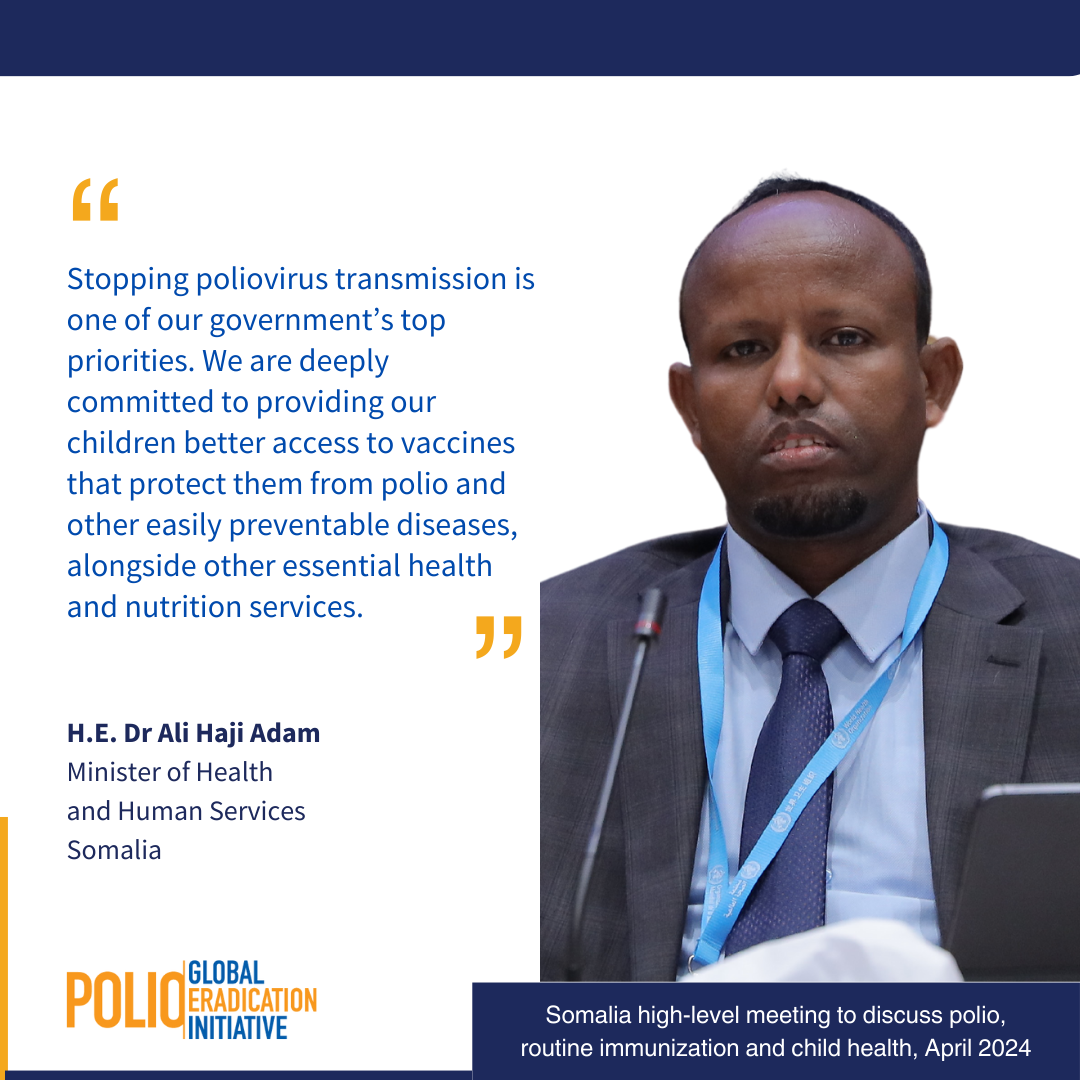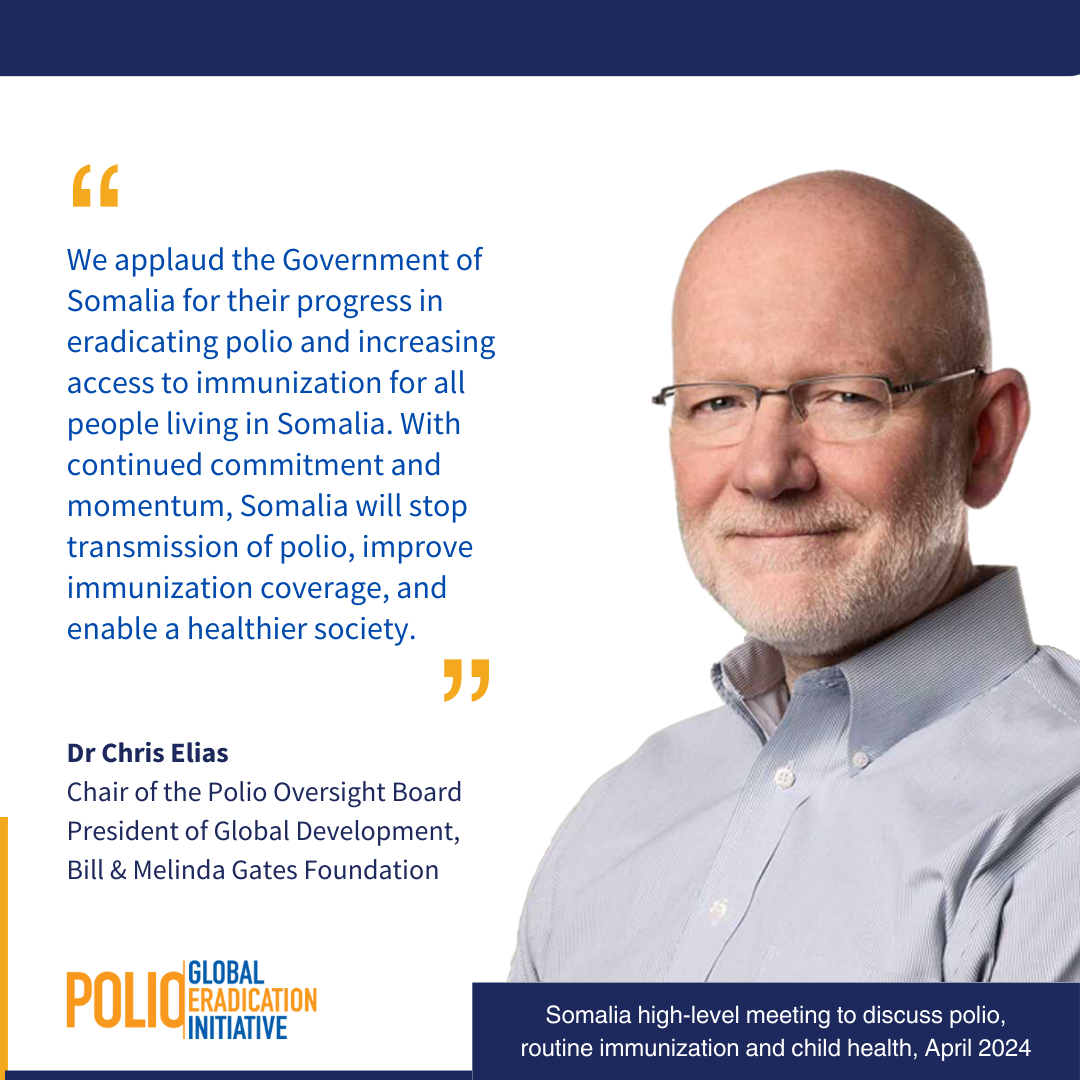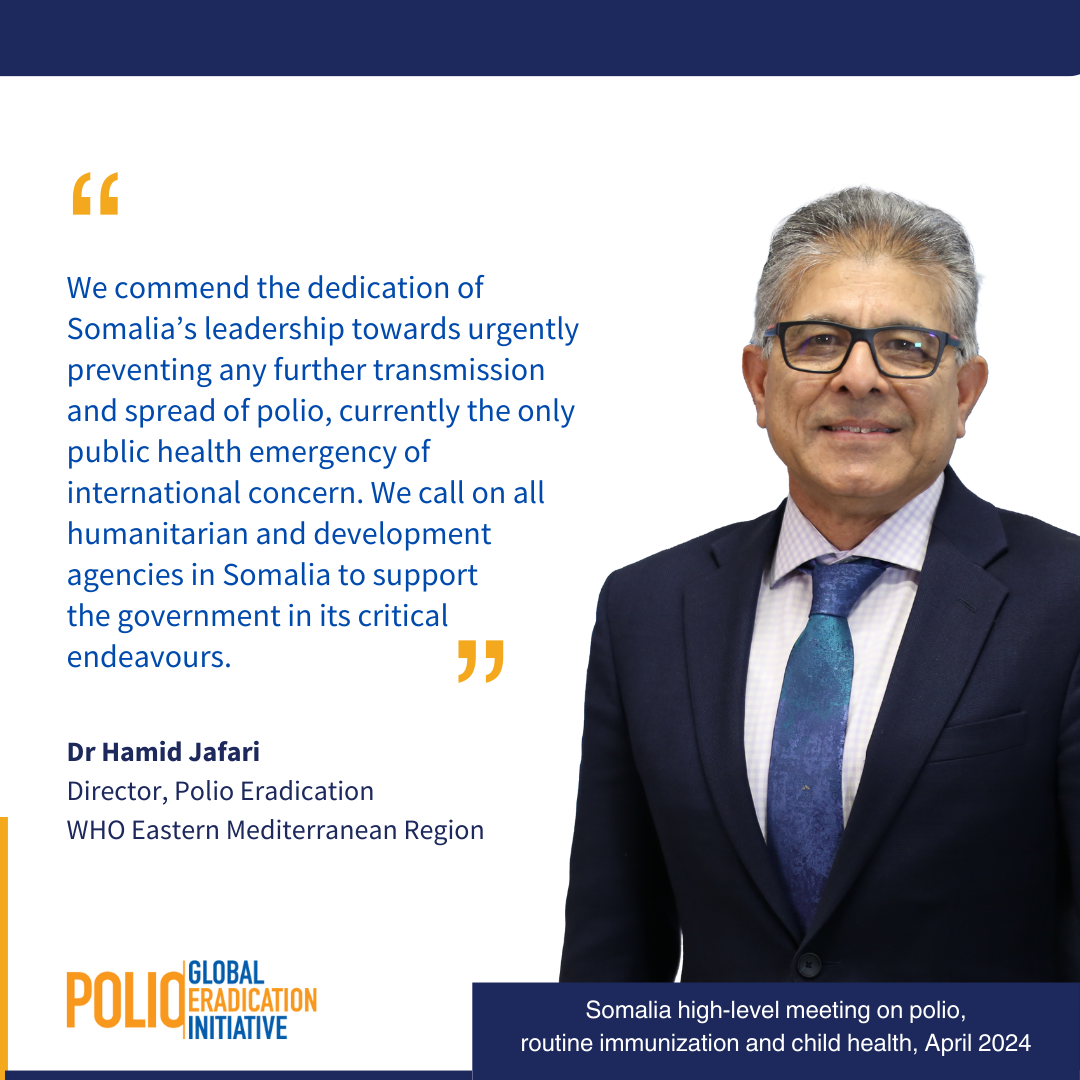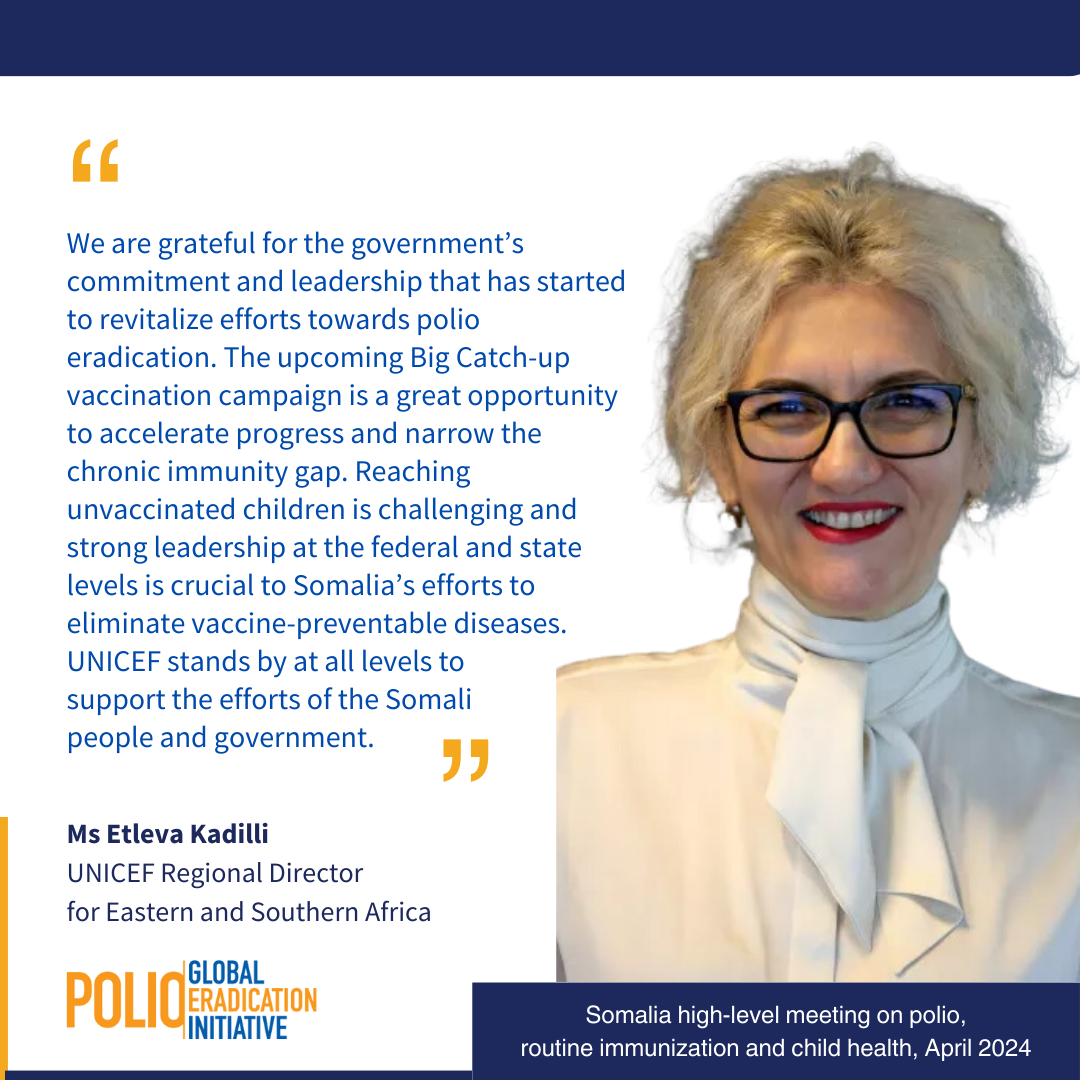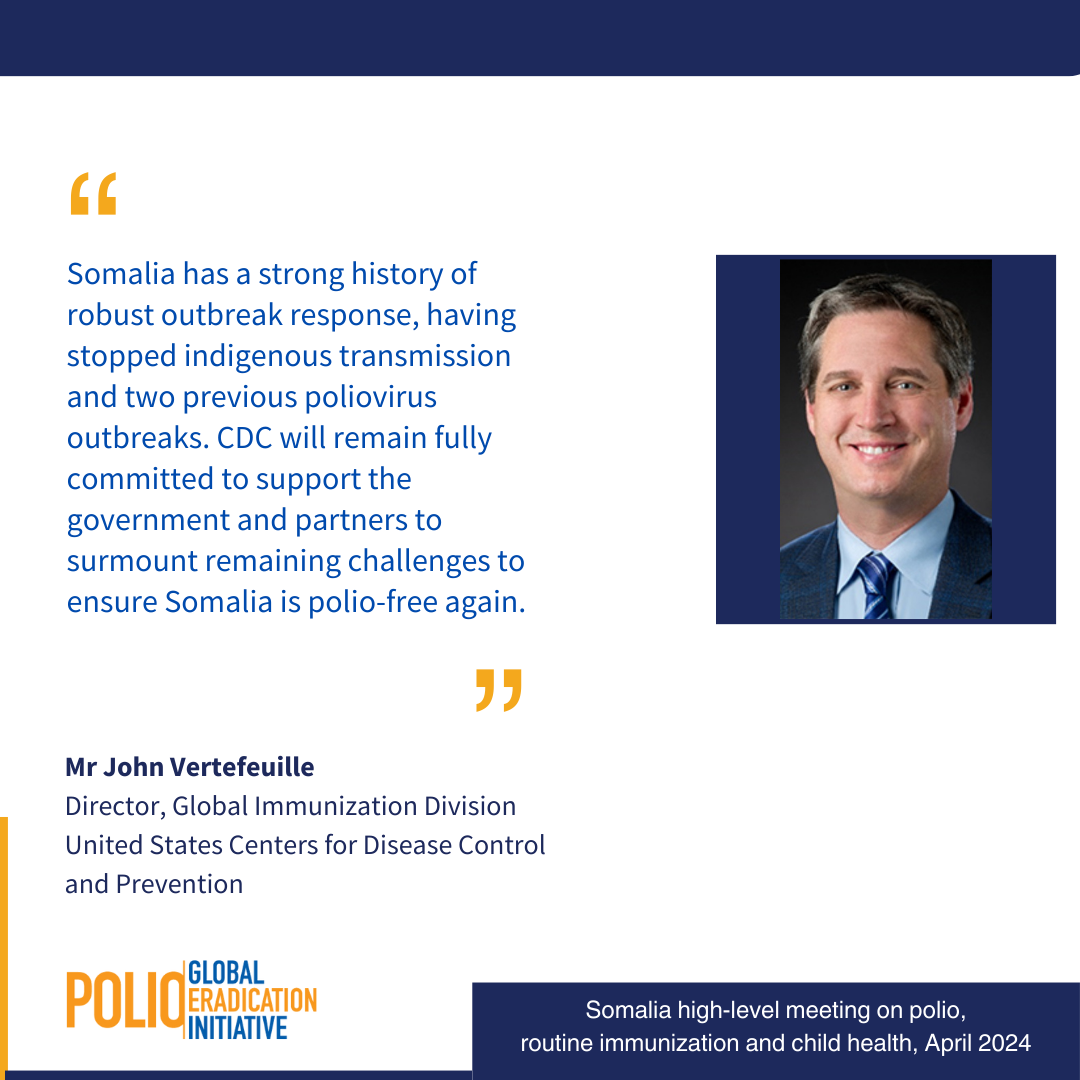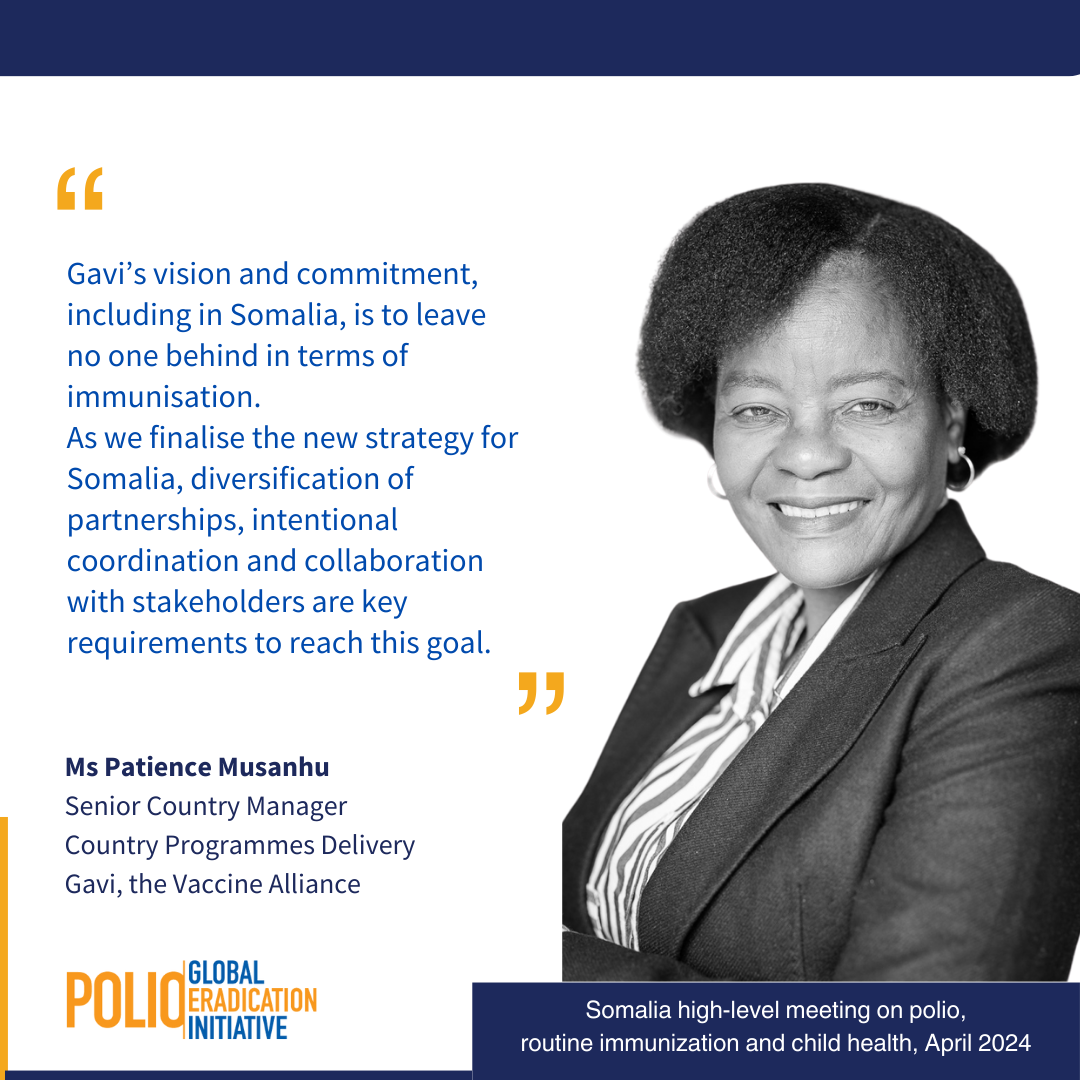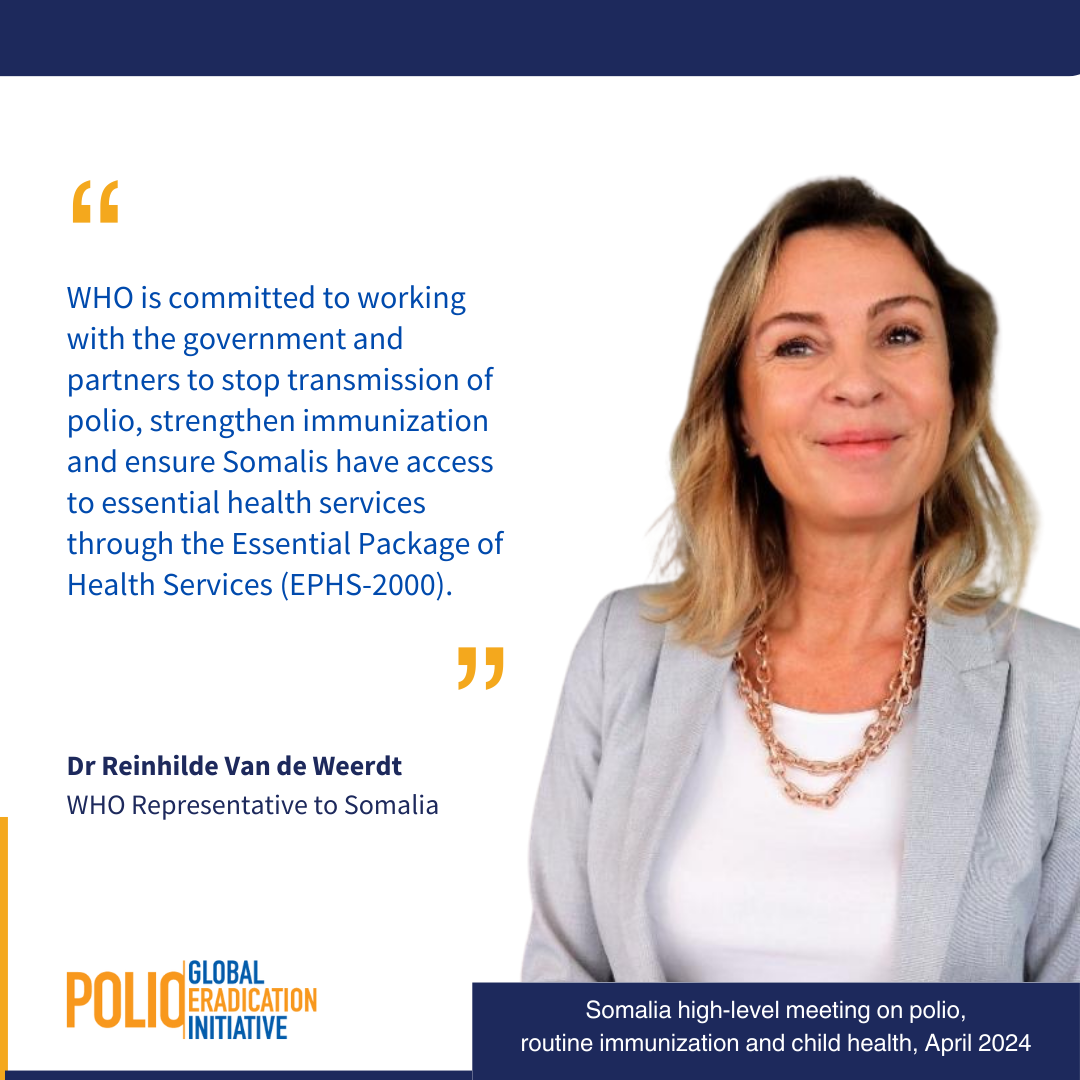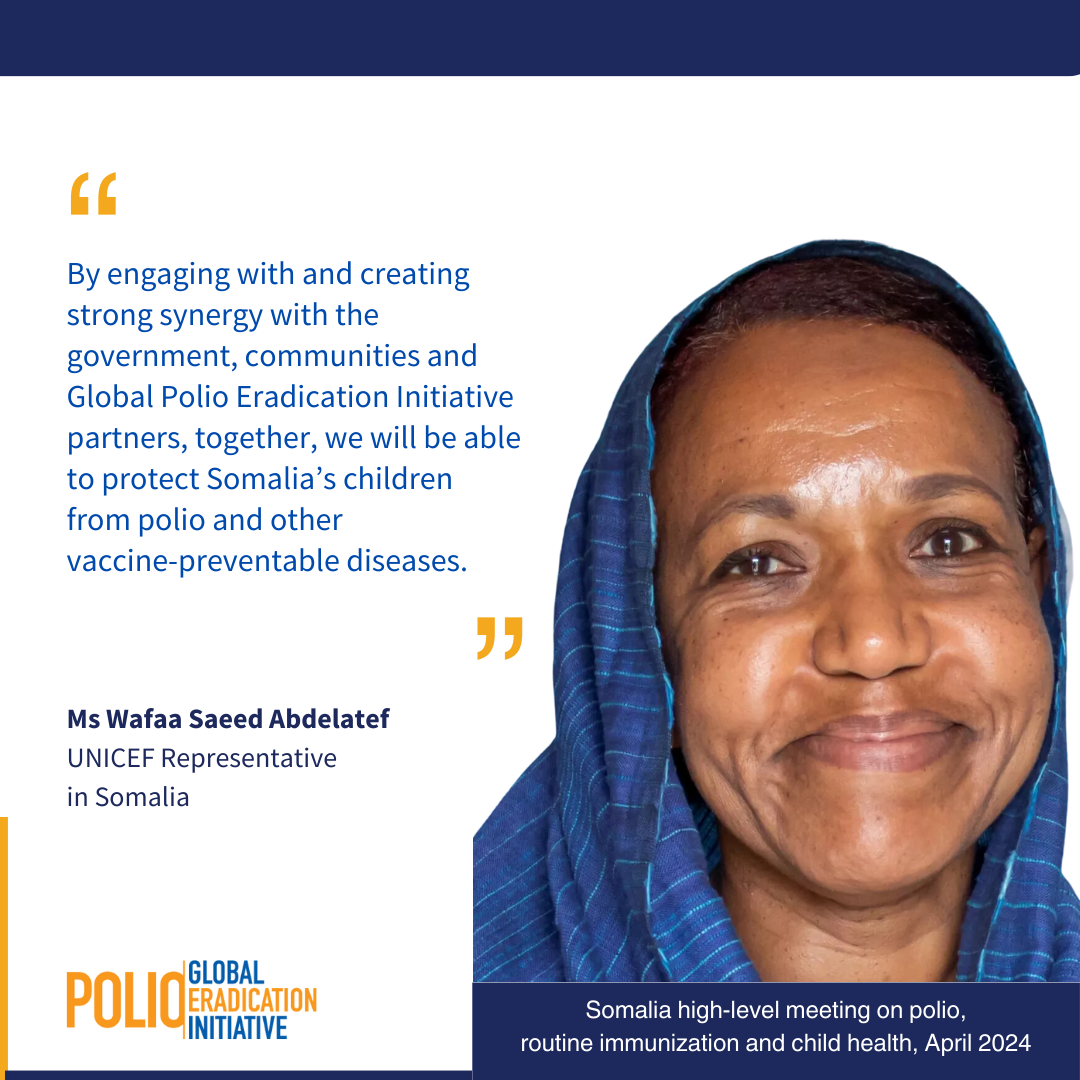Somalia marks World Immunization Week with a call to accelerate efforts to reach every child with essential, life-saving immunizations
29 April 2024, Mogadishu, Somalia – While marking World Immunization Week this year, Somalia’s Federal Ministry of Health, the World Health Organization (WHO) and the United Nations Children’s Fund (UNICEF) have jointly urged partners and donors to accelerate immunization efforts to reach every child in Somalia.
This year’s World Immunization Week coincides with the 50th anniversary of the global Essential Programme on Immunization and aims to spur greater engagement around immunization, to reiterate the importance of vaccination and improve the health and well-being of every child, everywhere. This year’s commemoration highlighted the successes of immunization in Somalia since 1978 and the challenges that require a concerted effort – the uninterrupted, 7-year circulation of the polio variant; the large number of children who have never been vaccinated (zero-dose children); the recurrent outbreaks of vaccine-preventable diseases like measles, diphtheria and whooping cough; and the need for an expanded resource envelope to tackle these challenges.
 Minister of Health Dr Ali Hajiadam Abubakar poses for a group photo with health partners to kick-start World Immunization Week 2024 in Mogadishu, Somalia. Photo credit: UNICEF/MaslahSpeaking at a press conference in Mogadishu on Sunday, Federal Minister of Health for Somalia Dr Ali Hajiadam Abubakar said that despite Somalia having had the best-performing immunization programmes in the Eastern Mediterranean Region historically, prolonged conflict and instability in the last few decades have resulted in a weakened, fragmented and severely underfunded health system.
Minister of Health Dr Ali Hajiadam Abubakar poses for a group photo with health partners to kick-start World Immunization Week 2024 in Mogadishu, Somalia. Photo credit: UNICEF/MaslahSpeaking at a press conference in Mogadishu on Sunday, Federal Minister of Health for Somalia Dr Ali Hajiadam Abubakar said that despite Somalia having had the best-performing immunization programmes in the Eastern Mediterranean Region historically, prolonged conflict and instability in the last few decades have resulted in a weakened, fragmented and severely underfunded health system.
“This year’s theme – Humanly Possible – serves as a powerful reminder of our collective responsibility to ensure that every child in Somalia has access to life-saving vaccines. The introduction of new vaccines such as the pneumococcal conjugate vaccine and rotavirus vaccine later this year will further help us to combat pneumonia and diarrhoea, 2 diseases that contribute greatly to child mortality in Somalia,” he said.
“The coverage in Somalia is still insufficient to effectively combat vaccine-preventable diseases, and consequently we have experienced various outbreaks,” said Ms. Patience Musanhu, Senior Country Manager for Gavi, the Vaccine Alliance. “I wish to reiterate Gavi’s commitment to continue its investment in vaccines and immunization to ensure equitable vaccination coverage across the country. I strongly urge all stakeholders to redouble their efforts to increase vaccination coverage to safeguard children against vaccine-preventable diseases.”
“Vaccines are one of the greatest success stories of public health. And yet, despite all the knowledge and resources available globally, children in Somalia continue to contract vaccine-preventable diseases. For example, in first quarter of 2024, 382 people have been confirmed for measles, 75% of which are children under 5 years of age in Somalia,” said Dr Reinhilde Van De Weerdt, WHO Representative to Somalia. “Greater efforts are needed, with an integrated approach to tackle the systemic challenges the country is facing by its health system, that affect the delivery of essential health services and hinder progress in Somalia’s commitment toward universal health coverage.”
Globally, immunization programmes have been the bedrock of primary health services in communities and countries due to their reach and coverage. A major landmark study released this week reveals that global immunization efforts have saved an estimated 154 million lives – or the equivalent of 6 lives every minute of every year – over the past 50 years. The vast majority of people saved – 101 million – were infants.
The study, led by WHO and to be published in The Lancet, shows that immunization is the single greatest contribution of any health intervention to ensuring babies not only see their first birthdays but also continue to lead healthy lives into adulthood.
“In Somalia, the threat from vaccine-preventable diseases remains alarmingly high, with an estimated 1.5 million children under 5 known as ‘zero-dose’ children. These children are the most vulnerable, having never received any vaccines, and are disproportionately affected by diseases such as measles, diphtheria and whooping cough,” said UNICEF Representative to Somalia Ms Wafaa Saeed. “Let us all commit, as leaders, health professionals and global citizens, to safeguard the future of our children by ensuring that every child in Somalia receives their right to immunization. Let’s make this humanly possible.”
Some of the challenges Somalia faces in ensuring all communities have access to vaccinations include a fragile health system, further impeded by conflict and natural disasters; limited access to cold chain facilities in remote areas and among hard-to-reach populations; and difficulty in reaching people living in insecure and inaccessible locations.
“The high number of unimmunized and underimmunized children in Somalia who live in contexts such as IDP [internally displaced person] camps, urban poor settings and hard-to-reach areas increases risks of vaccine-preventable disease outbreaks. For the past 5 years, we have been grappling to respond to at least 2 outbreaks each year, as evident from the national surveillance reports,” said Save the Children Acting Country Director Dr Binyam Gebru. “While we stand here today in solidarity to mark this World Immunization Week, let’s reaffirm our commitment to ensure every child in Somalia gets immunized, which is a basic human right, and I believe with concerted efforts, this is humanly possible."
Over the years, WHO, UNICEF and partners have extended support to Somalia to develop systems to store different vaccines, establish systems to vaccinate children, and to compile and store data around immunization for decision-makers to use. Despite all the challenges, Somalia has had some success in getting more children vaccinated using strategies such as mobile outreach facilities in addition to fixed vaccination sites. Additionally, teams of health workers and social mobilizers, supported by the government, WHO and UNICEF, are regularly visiting communities to share messages on the benefits of vaccination.
Yet the country needs more support to protect children, particularly vulnerable ones, from vaccine-preventable diseases such as measles, cholera, polio, diphtheria, tuberculosis, pertussis and tetanus.
For additional information, please contact:
Mohamed Osman, Head of Communication and Public Engagement, Federal Ministry of Health
Email:
Victor Chinyama, Chief of Communication, UNICEF Somalia
Email:
Fouzia Bano, Communications Officer, WHO Somalia
Email:
Somalia’s tangible progress on malaria, even in the face of new strains
 A team engages in insecticide residual spraying as a core interruption measure in response to the malaria outbreak in Burtinle, in Puntland, Somalia. Photo credit: WHO Somalia/A. Mukhtar25 April 2024, Mogadishu, Somalia – Somalia managed to reduce the prevalence rate of malaria from 20.1% in 2015 to 4.1% in 2023 in the most affected areas by adopting an integrated disease response. The Federal Ministry of Health in Somalia led this work, with technical support from WHO and the United Nations Children’s Fund (UNICEF) and financial support from the Global Fund.
A team engages in insecticide residual spraying as a core interruption measure in response to the malaria outbreak in Burtinle, in Puntland, Somalia. Photo credit: WHO Somalia/A. Mukhtar25 April 2024, Mogadishu, Somalia – Somalia managed to reduce the prevalence rate of malaria from 20.1% in 2015 to 4.1% in 2023 in the most affected areas by adopting an integrated disease response. The Federal Ministry of Health in Somalia led this work, with technical support from WHO and the United Nations Children’s Fund (UNICEF) and financial support from the Global Fund.
Applying prevention, interruption and supplementary measures, Somalia’s malaria programme reduced disease incidence to as low as 3.4% in 2022, as documented by the country’s National Malaria Control Programme. The slight increase in incidence in 2023, to 4%, was due to the impact of drought and floods in the country.
Marking World Malaria Day 2024, Dr Sagal Roble of the Federal Ministry of Health thanked the partners and donors for helping Somalia to achieve this tangible progress. She also urged the continued support of the partners to address the new strains of malaria emerging in the country and to sustain gains made in the fight against malaria across Somalia. Such an approach supports this year’s World Malaria Day theme of “Accelerating the fight against malaria for a more equitable world”.
During 2023, Somalia increasingly detected a new strain of the parasite Plasmodium falciparum, which is hard to detect with the usual rapid diagnostic test, as well as a new urban invasive vector for malaria, the mosquito Anopheles stephensi, in several districts.
A prolonged drought affected Somalia from 2022 to 2023, and the country has since been hit by heavy rainfalls due to the El Niño phenomenon. Such rapid changes to climate, including temperature, rainfall patterns and humidity, could easily lead to further geographic expansion of malaria transmission or new variation.
Somalia also has a large number of people on the move: nomadic communities, internally displaced people, and people entering from the neighbouring countries of Djibouti, Ethiopia, Kenya and Yemen. This tends to increase the disease prevalence, including malaria, owing to contributing factors such as overcrowded environments, limited access to health care, and lack of awareness.
Dr Jamal Amran, WHO Somalia’s focal person for malaria control, highlighted: “Detection of new malaria strains, compounded by persistent insecurity and health impacts of climate change, may exacerbate the malaria situation in the country.”
Malaria directly endangers health and costs lives. The disease also continues the vicious cycle of inequity, as it disproportionately affects the most vulnerable groups, including pregnant women, children aged under 5 years, refugees, migrants and internally displaced people.
The WHO Country Office in Somalia, in partnership with UNICEF, continues to support the Federal Ministry of Health to implement Somalia’s National Malaria Strategic Plan 2021–2026.
For more information, please contact:
Fouzia Bano, Communications Officer, WHO Somalia
Email:
Saeed Ahmed, Donor Reporting Officer, WHO Somalia
Email:
Related links
King Salman Relief helps equip 28 health facilities with medical oxygen to address killer diseases among children
 The Ministry of Health of Somalia receives medical equipment and supplies for 28 health facilities in Mogadishu. Photo credit: WHO Somalia/I. Taxta18 April 2024, Mogadishu, Somalia – Biomedical equipment and essential medicines are to reach 28 health facilities across Somalia thanks to the “Every Breath Counts” project, funded by the King Salman Humanitarian Aid and Relief Centre (KS Relief). The Federal Ministry of Health kicked off the distribution of the supplies in collaboration with the WHO Country Office in Somalia.
The Ministry of Health of Somalia receives medical equipment and supplies for 28 health facilities in Mogadishu. Photo credit: WHO Somalia/I. Taxta18 April 2024, Mogadishu, Somalia – Biomedical equipment and essential medicines are to reach 28 health facilities across Somalia thanks to the “Every Breath Counts” project, funded by the King Salman Humanitarian Aid and Relief Centre (KS Relief). The Federal Ministry of Health kicked off the distribution of the supplies in collaboration with the WHO Country Office in Somalia.
The project supports quality emergency care of severe cases of pneumonia and diarrhoea for children. A child born in Somalia today is almost 20 times more likely to die by the age of 5 years than a child born elsewhere due to childhood diseases. Therefore, “Every Breath Counts” aims to reduce childhood pneumonia- and diarrhoea-related morbidity and mortality in Somalia.
Under the KS Relief-funded project, WHO Somalia supports the state-level of health ministries with the provision of life-saving health interventions in primary health centres and referral hospitals. This is done in line with WHO guidelines for the integrated management of newborn and childhood illnesses. Support provided for the health facilities includes the establishment of triage protocols and oral rehydration treatment corners, and provision of medical oxygen and essential medicines.
Dr Guled Abdi Jalil Ali, Director-General of the Federal Ministry of Health of Somalia, officiated the handover ceremony of medical equipment and supplies. Representatives from the KS Relief country team, the Ministry and WHO Somalia were present.
Speaking in appreciation of WHO Somalia’s technical support and the financial support of KS Relief, Dr Guled said: “Considering that child mortality from all causes in Somalia remains the highest in the world, this project is a critical contribution to help improve the coverage and quality of care for our children, with a focus on the main killer diseases, and to build health care capacities.”
Following the recipient of the equipment and medical supplies, the state-level health ministries, with support from WHO Somalia, will deliver equipment and supplies to the targeted facilities to improve the quality of care. In addition, supplies, such as vitamin A, folic acid, albendazole (deworming tablets), zinc and oral rehydration solution, will be distributed at the community level through community health workers to strengthen the delivery of health services.
Mr Mohamed Omar Hassan, Media Officer at KS Relief country team in Somalia, thanked the Federal Ministry of Health and WHO Somalia for their hard work in implementing the project and for their ongoing and successful partnership.
For more information, please contact:
Fouzia Bano, Communications Officer, WHO Somalia
Email:
Saeed Ahmed, Donor Reporting Officer, WHO Somalia
Email:
For more details about WHO’s response across Somalia, see:
Every Breath Counts: increasing access to medical oxygen in Somalia
Somalia’s health minister and partners plan to intensify efforts to end 7-year variant poliovirus outbreak
Partners commit to take bold steps to boost routine immunization and child health in Somalia
 A health worker vaccinates a child from a nomadic family, Puntland. WHO/WHO Somalia16 April 2024, Mogadishu, Somalia – Somalia’s Minister of Health and Human Services His Excellency Dr Ali Haji Adam and high-level representatives of the Global Polio Eradication Initiative met virtually yesterday to review progress and further scale up efforts to end the country’s 7-year variant poliovirus outbreak.
A health worker vaccinates a child from a nomadic family, Puntland. WHO/WHO Somalia16 April 2024, Mogadishu, Somalia – Somalia’s Minister of Health and Human Services His Excellency Dr Ali Haji Adam and high-level representatives of the Global Polio Eradication Initiative met virtually yesterday to review progress and further scale up efforts to end the country’s 7-year variant poliovirus outbreak.
H.E. Dr Adam presented the Somalia Emergency Action Plan (SEAP) 3, which builds on measures taken so far and will fill existing gaps in polio eradication efforts. The plan prioritizes robust, high-quality polio vaccination campaigns and better poliovirus surveillance. Efforts will also be targeted at high-risk populations in hard-to-reach areas and where variant poliovirus is circulating, as well as underserved, displaced and nomadic communities.
The Minister also shared updates on the planned Big Catch-up campaign, which aims to accelerate vaccination of zero-dose children – who have received no vaccines – and capitalize on integration with other health and nutrition services.
Meeting delegates included Dr Chris Elias, Chair of the Polio Oversight Board and President of Global Development, Bill & Melinda Gates Foundation; Mr John Vertefeuille, Director, Global Immunization Division, United States Centers for Disease Control and Prevention; Ms Patience Musanhu, Senior Country Manager, Country Programmes Delivery at Gavi, the Vaccine Alliance; Ms Etleva Kadilli, United Nations Children’s Fund (UNICEF) Regional Director for Eastern and Southern Africa; and Dr Hamid Jafari, Director, Polio Eradication, World Health Organization (WHO) Eastern Mediterranean Region. Ms Wafaa Saeed Abdelatef, UNICEF Representative in Somalia, and Dr Reinhilde Van de Weerdt, WHO Representative to Somalia, also joined the meeting.
“Stopping poliovirus transmission is one of our government’s top priorities,” said H.E. Dr Ali Haji Adam, Minister of Health and Human Services for Somalia. “We are deeply committed to providing our children better access to vaccines that protect them from polio and other easily preventable diseases, alongside other essential health and nutrition services.”
The ongoing variant poliovirus outbreak, the longest running of its kind, has so far paralysed 38 children in Somalia. Through SEAP 3, Somalia will continue to work with humanitarian partners to reach about 1.5 million zero-dose children, most of whom live in the country’s highly populated central and southern areas.
“We applaud the Government of Somalia for their progress in eradicating polio and increasing access to immunization for all people living in Somalia. With continued commitment and momentum, Somalia will stop transmission of polio, improve immunization coverage, and enable a healthier society,” said Dr Chris Elias, Chair of the Polio Oversight Board and President of Global Development, Bill & Melinda Gates Foundation.
Somalia is seen as one of the world’s 6 most critical locations for polio transmission, known as consequential geographies, owing to the high risk of poliovirus spread to other countries.
“We commend the dedication of Somalia’s leadership towards urgently preventing any further transmission and spread of polio, currently the only public health emergency of international concern,” said Dr Hamid Jafari, Director, Polio Eradication, WHO Eastern Mediterranean Region. “We call on all humanitarian and development agencies in Somalia to support the government in its critical endeavours.”
“We are grateful for the government’s commitment and leadership that has started to revitalize efforts towards polio eradication,” said Ms Etleva Kadilli, UNICEF Regional Director for Eastern and Southern Africa. “The upcoming Big Catch-up vaccination campaign is a great opportunity to accelerate progress and narrow the chronic immunity gap. Reaching unvaccinated children is challenging and strong leadership at the federal and state levels is crucial to Somalia’s efforts to eliminate vaccine-preventable diseases. UNICEF stands by at all levels to support the efforts of the Somali people and government.”
Somalia is also currently grappling with a measles outbreak. The country faces complex challenges, including recurrent drought, floods and persistent insecurity, which have affected health service delivery and spurred population movement over the years.
Additional quotes from the meeting*
For more information, contact:
Ministry of Health and Human Services Communications Office
Email:
Fouzia Bano, Communications Officer, WHO Somalia
Email:
Victor Chinyama, Chief of Communications, UNICEF Somalia
Telephone: +25 26 13 37 58 85
World TB Day 2024: Somalia reaffirms commitment to make TB history
 24 March 2024, Mogadishu, Somalia – WHO Somalia, in collaboration with the Federal Ministry of Health and Human Services, marks World Tuberculosis Day 2024 with a renewed commitment to end the tuberculosis (TB) epidemic. Under the theme “Yes! We can end TB!”, WHO aims to inspire hope and promote high-level leadership, increased investments, faster uptake of new WHO recommendations and innovations, and multisectoral collaboration to combat TB.
24 March 2024, Mogadishu, Somalia – WHO Somalia, in collaboration with the Federal Ministry of Health and Human Services, marks World Tuberculosis Day 2024 with a renewed commitment to end the tuberculosis (TB) epidemic. Under the theme “Yes! We can end TB!”, WHO aims to inspire hope and promote high-level leadership, increased investments, faster uptake of new WHO recommendations and innovations, and multisectoral collaboration to combat TB.
“Somalia’s TB programme has weathered recurring climatic shocks, insecurity and the COVID-19 pandemic to show an 87% treatment success rate, 14% decrease in TB incidence, and increase in TB treatment centres from a mere 7 to 109 in the past 2 decades,” said Mr Mohamed Jafar, National TB Programme Manager, Federal Ministry of Health and Human Services. “Even though we are making progress, we still need more support to sustain the gains made over the years, especially in the form of molecular testing machines and outreach activities, as both are critical for case detection.”
TB is a major public health problem in Somalia. Despite the country’s fragility, Somalia’s TB programme has made significant progress since it was re-established in 1995 following its collapse early in the civil war. TB incidence has reduced from 286 cases per 100 000 population in 2010 to 246 cases per 100 000 population in 2023 – a 14% decrease over 14 years.
The number of TB treatment centres in Somalia grew from just 7 centres in 1995 to 109 centres in 2023. TB cases enrolled on treatment have also gradually increased in number, from 10 469 cases per year in 2010 to 18 604 cases per year in 2023. Overall, during this period, the programme enrolled a total of 211 554 TB cases on treatment. The programme successfully saved the lives of 184 052 TB cases from 2010 to 2023 – giving an average treatment success rate of 87%.
WHO Somalia helped the Ministry of Health to establish Somalia’s first treatment centre for drug-resistant TB in 2013 and there are now 11 such centres, which together cover the whole country. Since 2015, a total of 2021 drug-resistant TB cases have been enrolled for treatment. Nearly 1456 of these cases were successfully treated (average treatment success rate of 72%).
Status of TB treatment in Somalia
Management of Somalia’s TB programme is based on WHO’s End TB Strategy, which involves adopting all its diagnostic and treatment regimens. The programme has deployed 100 molecular testing machines, 10 of which are coloured modules for rapid diagnosis of tuberculosis, including cases resistant to second-line TB drugs.
Introduction of this module is proving to be a game-changer in the diagnosis of drug-resistant TB in Somalia. Multidrug resistance can now be diagnosed in the country’s peripheral TB centres instead of solely at its TB culture laboratories. It has three TB culture laboratories capable of diagnosing TB drug resistance to second line TB drugs.
The TB programme is slowly but surely integrating into the country’s emerging primary health care system and private sector. Currently, nearly 50% of the TB centres are fully integrated with primary health care. Also, 7 private hospitals are implementing National TB programme policies to manage TB cases, including reporting quarterly to the TB programme.
Referral mechanisms are also in place to connect other private health providers to the National TB programme. In addition, community involvement in the programme is a key priority, not least because community health workers play an active role in identification and referral of potential TB cases. They also promote treatment adherence and advocacy in the community.
Dr Sindani Ireneaus Sebit, WHO’s focal person for Somalia’s TB programme, said: “As a major partner to the National TB programme, WHO continues to provide essential technical assistance to the Ministry of Health and plays a vital role in TB drug management to ensure that TB drugs are available to patients at their convenience, with no chance of stock-outs.” He added: “As we celebrate World TB Day, let us remember that with the effective coordination created in country among various partners and by exploring further resources, ‘Yes! We can end TB!’ in Somalia.”
For more information, please contact:
Fouzia Bano, Communications Officer, WHO Somalia
Email:
Saeed Ahmed, Reporting/External Relations Officer, WHO Somalia
Email:
ECHO funds help provide lifesaving health supplies and services to over 5 million population across drought-affected states in Somalia
 ECHO-funded project helped equip 11 nutrition stablisation centres across target districts with severe acute malnutrition kits to record a cumulative average cure rate of 94.25% amongst under five children. Photo Credit: WHOSom/I. Taxta18 March, 2024 - Mogadishu, Somalia - The United Nations Population Fund (UNFPA) and the World Health Organization (WHO), with funding from the European Civil Protection and Humanitarian Aid Operations (EU ECHO), have supported the Federal and State Ministries of Health to provide lifesaving health supplies and services to over 5 million people across drought-affected areas of Banadir, South West, Jubbaland and Galmudug states in Somalia.
ECHO-funded project helped equip 11 nutrition stablisation centres across target districts with severe acute malnutrition kits to record a cumulative average cure rate of 94.25% amongst under five children. Photo Credit: WHOSom/I. Taxta18 March, 2024 - Mogadishu, Somalia - The United Nations Population Fund (UNFPA) and the World Health Organization (WHO), with funding from the European Civil Protection and Humanitarian Aid Operations (EU ECHO), have supported the Federal and State Ministries of Health to provide lifesaving health supplies and services to over 5 million people across drought-affected areas of Banadir, South West, Jubbaland and Galmudug states in Somalia.
The 24-month ECHO-funded project is to increase access to life-saving health and nutrition services for populations within IDP camps and host communities and addressing the needs of pregnant and lactating women, elderly individuals, and children under five in drought and conflict-affected areas.
Both the WHO and UNFPA supported federal and state ministries of health, and partner organizations to provide life-saving preventative and care services through the procurement and distribution of essential medical supply for effective case management of severe acute malnutrition with medical complications in children, essential health and severe malnutrition kits (including reproductive health kits), as well as to support the timely detection and response to outbreaks. The beneficiaries of these health interventions included over 50% of women and over 1.2 million under-five years of age children in the drought-affected communities.
Simultaneously, the WHO and UNFPA partnership helped mitigate the impact of flash flooding resulting from El-Nino impact in Jubbaland and surrounding states by providing healthcare services to internally displaced populations towards the last quarters of 2023.
Mr. Niyi Ojuolape, UNFPA Somalia Country Representative, commented, 'We are committed to mitigating the impact of drought and conflict on vulnerable populations, particularly pregnant women and young children.'
Dr Renee Van de Weerdt, WHO Representative to Somalia, while appreciating the collaboration between WHO, UNICEF, UNFPA and the Ministry of Health said, 'The drought and food insecurity have severely impacted people health and the Somalian health system. WHO is committed to support the government of Somalia to make the health system more resilient and adapted to climate-related events .'
With support from ECHO, UNFPA, UNICEF and WHO and its health cluster partners will continue to support the government of Somalia with the procurement and distribution of medical supplies to manage severe acute malnutrition, provide emergency obstetric and neonatal care and other reproductive health services, and better detect and respond to outbreaks until April 2025.
For media inquiries, please contact:
UNFPA, Somalia: Fatimah Shah, Communications & Advocacy Specialist,
WHO, Somalia: Fouzia Bano, Communications Officer,
*Note to Editors:
ECHO is the Humanitarian Aid department of the European Commission that provides emergency assistance and relief to the victims of natural disasters or armed conflict outside the European Union.
UNFPA is the United Nations’ (UN) agency that promotes reproductive health, gender equality, and population development to improve the well-being of individuals and communities worldwide.
WHO is the UN’s specialized agency of the United Nations responsible for international public health and leading the health cluster in Somalia.
This project builds on ECHO’s previous support to WHO’s drought response entitled “Support to essential life-saving primary healthcare services and epidemic detection and response through the procurement and distribution of essential medical equipment, supplies and medicines to drought-affected districts in Somalia”.
Further information is available at
[1] https://www.emro.who.int/somalia/priority-areas/drought-response.html
International Women’s Day 2024: advancing gender equality in Somalia’s health workforce
 8 March 2024, Mogadishu, Somalia – Somalia’s health ministry and WHO observed International Women’s Day 2024 with a resolve to improve life for women in Somalia by empowering the female health workforce. To do so, they will address policy, human resource and operational matters, as well as capacity-building gaps for women in the health sector.
8 March 2024, Mogadishu, Somalia – Somalia’s health ministry and WHO observed International Women’s Day 2024 with a resolve to improve life for women in Somalia by empowering the female health workforce. To do so, they will address policy, human resource and operational matters, as well as capacity-building gaps for women in the health sector.
“Invest in women: Accelerate progress” is this year’s theme for the global day – and a timely reminder to world leaders to meet the targets of Sustainable Development Goal 3.
Dr Naima Abdulkadir, Manager of Reproductive Health at the Federal Ministry of Health and Human Services, thanked WHO for its support to various capacity-building efforts by the Ministry. She said she hoped: “WHO will continue to invest in trainings like mid-level management, integrated management of newborn and childhood illnesses, basic as well as emergency obstetric and newborn care, maternal and perinatal death surveillance and response and support for survivors of gender-based violence, because initial results of these trainings have been very encouraging and it will surely help in women’s empowerment in the health sector especially in newly liberated areas and in decision-making bodies.”
Life is harsh for many girls and women in the country. Somalia ranks fourth lowest among all countries globally for gender equality; its maternal and infant mortality rates are some of the highest in the world; and child marriage is widespread.
Women are often more affected than men by the recurring climatic shocks and ongoing conflicts that cause mass displacement across the country. More than 80% of the country’s 3.8 million internally displaced people are women and children. Many of them lack access to basic health services such as psychosocial support, reproductive health services, child and adolescent health services, and support for survivors of gender-based violence.
Somalia remains one of the most dangerous places to give birth. One in 1000 girls and women of reproductive age (15–49 years) die due to pregnancy or birth-related complications. Access to antenatal and postnatal care is still very limited: only 24% of women receive the WHO-recommended 4 or more antenatal care sessions during their pregnancy.
Despite recurring droughts, the COVID-19 pandemic and El Niño-related floods in Somalia, WHO and the Federal Ministry of Health and Human Services have made some progress in addressing women’s health issues under the wider umbrella of universal health coverage.
WHO Somalia supported the Ministry to revise (and cost the operational plan for) the National Reproductive, Maternal, Newborn, Child and Adolescent Health (RMNCAH) Strategy for 2023–2027. It also helped developing various guidelines for health worker capacity-building and for preparing women for health sector leadership roles.
The National Health Professionals Council, the regulatory framework for health professionals, is accelerating the process for registration of nurses and midwives, mostly women. In terms of patients’ right to health, the regulations and code of conduct are promoting the entitlement of women to decide about medical treatment, a critical step on a long way.
Dr Al-Umra Umar, Programme Lead for RMNCAH at WHO Somalia, welcomed the validation of the National RMNCAH Strategy, and added: “To tackle the high maternal and neonatal as well as under-five mortality, we urge the donor community to step up and help WHO streamline and reform the health sector by investing in an evidence-based and women-centred futuristic roadmap.”
“Slowly but gradually, we have managed to assemble an accountable and measurable framework to help address the predicaments of Somalia’s women, newborns and adolescents,” she said. “We will continue to build the capacities of women to help them take on decision-making and leadership roles.”
Media contacts
For more information, please contact:
Fouzia Bano, Communications Officer, WHO Somalia
Email:
Saeed Ahmed, Donor Reporting and External Relations Officer, WHO Somalia
Email:
Notes to editors
Somalia has some of the highest rates of neonatal and under-five mortality in the world, with an under-five mortality rate of 117 per 1000 live births. In addition, more than 1.5 million children aged under 5 years are currently at risk of severe malnutrition and related health complications due to the ongoing drought crisis. Somalia has a significant population of young people: over 45% of the population is aged under 15 years; about 75% of the population is aged under 30 years.
The latest Somali Health and Demographic Survey shows that female genital mutilation affects 99.2% of girls and women aged 15–49 years. This harmful practice has both short- and long-term physiological, sexual and psychological impacts. Gender-based violence is one of the most prevalent human rights violations faced by people, women especially, across the globe. Since the outbreak of COVID-19, women and girls have faced an even greater risk of such violence. Moreover, 35% of girls in Somalia go through child marriage, and there is no legal framework to stop it in courts.
Somalia’s gross domestic product per capita has consistently ranked among the 5 lowest in the world over the last decade; in 2020, it was the second lowest globally. In 2019, the International Labour Organization estimated labour force participation among those aged 15–64 years at 73.6% for men and just 23.1% for women. These figures have been relatively stable over the past 10 years. Agriculture still employs more men (79.2% of the labour force) and women (83.9%) than any other sector.
CERF support safeguards lives of 95.9% of children at WHO-Supported stabilization centres in Somalia
 WHO–CERF support helped Somalia’s Federal Ministry of Health to set up outreach camps for flood-affected communities across Jubaland and Hirshabelle states. Photo credit: WHO Somalia/A. Mustaf08 February 2024, Mogadishu, Somalia – The WHO Country Office in Somalia, with timely support from the Central Emergency Response Fund (CERF), has helped to avert major diseases outbreaks after flash flooding caused by El Niño. The floods, which hit the country in November 2023, damaged infrastructure and affected the livelihoods and health of over 1.17 million people across Jubaland and Hirshabelle states.
WHO–CERF support helped Somalia’s Federal Ministry of Health to set up outreach camps for flood-affected communities across Jubaland and Hirshabelle states. Photo credit: WHO Somalia/A. Mustaf08 February 2024, Mogadishu, Somalia – The WHO Country Office in Somalia, with timely support from the Central Emergency Response Fund (CERF), has helped to avert major diseases outbreaks after flash flooding caused by El Niño. The floods, which hit the country in November 2023, damaged infrastructure and affected the livelihoods and health of over 1.17 million people across Jubaland and Hirshabelle states.
“The floods have swept away everything we had, but thanks to WHO, my 2 children have survived not only droughts and floods but are now recovering from severe malnutrition at the Kismayo General Hospital,” said the worried but satisfied Rasuliyan, mother of Haniya (aged 3 years) and Uthman (aged 4 years) while visiting one of 64 WHO-supported stabilization centres in the country.
To mitigate the impact of El Niño and the Indian Ocean Dipole, WHO Somalia – with the support from CERF – supported the federal and state ministries of health to boost their efforts to meet the growing needs of over 500 000 displaced people. It did so by deploying over 25 outreach teams – comprising 100 health workers in total: nurses, clinicians, social workers and nutrition screeners – and 130 community health workers (CHWs).
By the end of January 2024, the outreach teams had managed to reach 163 880 people, including 4148 pregnant women, in the most affected districts across the 2 states. They held 93 416 outpatient consultations, administered 23 145 vaccinations and referred 5418 people with severe medical ailments to more specialized care.
The WHO–CERF initiative has helped to equip and staff the stabilization centres at Kismayo General Hospital, Baardheere District Hospital, Beledweyne Hospital and Jowhar Hospital to support the management of cases of acute malnutrition with complications. These cases may be referred by the CHWs and the outreach teams or may be admitted via another entry point.
 Outreach teams screened 33 767 children aged under 5 years, identifying 4833 children with severe acute malnutrition who were referred to outpatient therapeutic and stabilization centres. Photo credit: WHO Somalia/A. Mustaf“Of all the admissions in these stabilization centres, 95.9% were cured,” said WHO’s Incident Manager Dr Ifeanyi Okudo. He added that CHWs remain crucial as they administer micronutrient supplements within the displaced communities. By the end of January, they had reached 4148 pregnant women with iron and folic acid to prevent anaemia and birth defects. They also provided 4088 children with vitamin A supplements to boost immunity to diseases such as measles and pneumonia and to prevent blindness, which is common in malnourished children.
Outreach teams screened 33 767 children aged under 5 years, identifying 4833 children with severe acute malnutrition who were referred to outpatient therapeutic and stabilization centres. Photo credit: WHO Somalia/A. Mustaf“Of all the admissions in these stabilization centres, 95.9% were cured,” said WHO’s Incident Manager Dr Ifeanyi Okudo. He added that CHWs remain crucial as they administer micronutrient supplements within the displaced communities. By the end of January, they had reached 4148 pregnant women with iron and folic acid to prevent anaemia and birth defects. They also provided 4088 children with vitamin A supplements to boost immunity to diseases such as measles and pneumonia and to prevent blindness, which is common in malnourished children.
The 130 CHWs deployed in the affected communities also helped screen 33 767 children aged under 5 years for malnutrition using mid-upper arm circumference tape. This effort identified 4833 children with severe acute malnutrition, who were referred to outpatient therapeutic and stabilization centres for care.
The CERF support also helped WHO to procure 22 paediatric kits for children with severe acute malnutrition. These have been provided to the stabilization centres in the Kismayo General, Baardheere District, Beledweyne and Jowhar hospitals. The kits will be used to manage cases of acute malnutrition with complications referred to the centres by the CHWs and the outreach teams.
For more information, please contact:
Fouzia Bano, Communications Officer, WHO Somalia
Email:
Saeed Ahmed, Reporting/External Relations Officer, WHO Somalia
Email:
Related links
Every Breath Counts: increasing access to medical oxygen in Somalia
 Supervisor General of King Salman Humanitarian Aoid and Relief Centre (KSrelief) His Excellency Abdullah Al Rabeeh address to inaugural ceremony of project in Mogadishu on 28 January 2024. Photo Credit: courtesy KSrelief
Supervisor General of King Salman Humanitarian Aoid and Relief Centre (KSrelief) His Excellency Abdullah Al Rabeeh address to inaugural ceremony of project in Mogadishu on 28 January 2024. Photo Credit: courtesy KSrelief
29 January 2024, Mogadishu, Somalia – A project to reduce the alarmingly high number of child deaths related to pneumonia and diarrhoea in Somalia has been formally launched by King Salman Humanitarian Aid and Relief Centre (KSrelief) and WHO. The Every Breath Counts project aims to increase access to medical oxygen, set up mother and child health care, establish oral rehydration centres and provide integrated health facilities in the fragile humanitarian setting of Somalia.
Child mortality from all causes in Somalia is among the highest in the world. A child born in Somalia today is about 16.5 times more likely to die before the age of 5 years than a child elsewhere. Every Breath Counts aims to reduce pneumonia- and diarrhoea-related morbidity and mortality among children aged under 5 years in the project’s target districts.
Supervisor General of KSrelief His Excellency Abdullah Al Rabeeah launched the project along with Prime Minister of Somalia His Excellency Hamza Abdi Barre, WHO Representative in Somalia Dr Sindani Ireneaus Sebit and other high-ranking government and United Nations officials.
H.E. Mr Hamza Abdi Barre expressed profound thanks to the visiting dignitaries, to Saudi Arabia and to KSrelief for extending much-needed support to Somalia’s fragile health system: “KSrelief and WHO are helping to set up a sustainable health delivery model which will prove beneficial not only for achieving universal health coverage but also Somalia’s key elements of Essential Package of Health Services.”
The project is set to equip 28 health facilities across 10 select drought- and pneumonia-affected districts with solar-powered oxygen concentrators. The project will also provide 90 oxygen cylinders, 15 baby incubators and 4 ambulances in total to the selected health facilities. In addition, the project will help set up 15 triage centres and oral rehydration centres.
H.E. Dr Abdullah Al Rabeeah said on launching the project: “KSrelief is investing in the future of Somalia by providing self-sustainable and environment-friendly solutions and ensuring that selected health facilities can run various medical procedures especially for children and women without power interruptions.”
An estimated 230 127 children aged under 5 years and more than 3.3 million community members will benefit from the project interventions. Over 700 health workers will be trained on screening, outreach and treatment procedures in the course of the project.
Praising KSrelief for investing in saving the lives of Somalia’s children, acting Head of Mission for WHO Somalia country office, Dr Sindani Ireneaus Sebit said: “Contrary to what this situation in Somalia looks like, WHO has shown that community-based outreach programmes involving visits by community health workers to individual households for the diagnosis, treatment and care of pneumonia and diarrhoea and linking these interventions to primary-level care facilities can be a game-changer.”
Currently, the under-five mortality rate in Somalia is 117 per 1000 live births, which is higher than the sub-Saharan African average of 76 deaths per 1000 per live births. Approximately 21% of these deaths among children aged under 5 years in Somalia are attributed to pneumonia, while 18–20% of the deaths are attributed to diarrhoeal diseases alone.
Project interventions
The KSrelief resources will help WHO to set up cost-effective and evidence-based life-saving interventions in 10 districts of Somalia. The focus will be on strengthening community-based preventive, promotive and curative care and care for sick children with symptoms of child pneumonia and diarrhoeal disease.
The project activities will also help strengthen the capacities of primary health care/maternity and child health centres and district hospitals (referral hospitals) to deliver essential health services for pregnant women and people with disabilities. Across the 10 target districts, 28 health facilities will also be equipped to deliver both ambulatory and acute care for sick children diagnosed with pneumonia or diarrhoeal disease.
The services will be aligned within the overarching framework of the Government of Somalia’s vision for universal health coverage. This is consistent with the Government’s plan for implementing its Essential Package of Health Services (EPHS 2020) at the community and primary levels of care to achieve universal health coverage.
Notes to editors
 Somalia’s under-five mortality rate is 117 deaths per 1000 live births – one of the highest rates in the world. Photo credit: WHO Somalia/ I. TaxtaThe integrated Global Action Plan for the Prevention and Control of Pneumonia and Diarrhoea set a global target to reduce pneumonia-related deaths in children aged under 5 years to 3 deaths per 1000 live births. Currently, however, there are 39.5 child pneumonia deaths per 1000 live births in Somalia – which shows how far the country is from achieving the global target.
Somalia’s under-five mortality rate is 117 deaths per 1000 live births – one of the highest rates in the world. Photo credit: WHO Somalia/ I. TaxtaThe integrated Global Action Plan for the Prevention and Control of Pneumonia and Diarrhoea set a global target to reduce pneumonia-related deaths in children aged under 5 years to 3 deaths per 1000 live births. Currently, however, there are 39.5 child pneumonia deaths per 1000 live births in Somalia – which shows how far the country is from achieving the global target.
Somalia has a high burden and prevalence of risk factors for childhood pneumonia and diarrhoea, including non-exclusive breastfeeding, overcrowding in camps for internally displaced people, high rates of malnutrition and indoor air pollution, poor immunization coverage, and lack of access to quality health care for sick children at the community level. These factors will continue to contribute to a high number of deaths from these preventable causes if the situation cannot be improved.
The current humanitarian situation in Somalia – which results from protracted conflict, civil war, climatic shock and mass displacement – also contributes to poor health service delivery across the country. This has resulted in poor access to health care for vulnerable groups such as disadvantaged children.
Over 7.8 million people in Somalia are adversely affected by climatic shock – of whom more than 1.1 million have been displaced. The Government has declared the current drought situation an “acute humanitarian emergency” and appealed for emergency assistance from international partners and humanitarian agencies.
The drought situation may further aggravate the health conditions of children aged under 5 years because of children’s worsening nutrition condition and the lack of health services in affected areas. This may lead to excess morbidity and mortality from high-burden diseases such as pneumonia and diarrhoeal diseases.
For additional information, please contact:
Fouzia Bano, Communications Officer, WHO Somalia
Email:
Saeed Ahmed, External Relations /Reporting Officer, WHO Somalia
Email:
For more details about WHO’s response across Somalia, see:
WHO and KSrelief helps trains 28 health professionals on basic emergency care
Somalia launches electronic immunization registry in latest leap of innovation
 With the launch of an electronic immunization registry in Somalia, WHO Somalia and the Federal Ministry of Health plan to improve the country’s immunization profile. Photo credit: WHO Somalia/I. Taxta
With the launch of an electronic immunization registry in Somalia, WHO Somalia and the Federal Ministry of Health plan to improve the country’s immunization profile. Photo credit: WHO Somalia/I. Taxta
16 January 2024, Mogadishu, Somalia – An electronic immunization registry is set to help increase and streamline immunization coverage in Somalia, with a special focus on children who are new to immunization, defaulters, zero-dose status or underimmunized. WHO Somalia, in collaboration with the United States Agency for International Development, has supported the Federal Ministry of Health to develop and launch the digital platform.
The immunization registry consists of tools that can be used to help monitor individual immunization schedules and store individual immunization histories. As such, using the platform and its tools can help enhance the performance of the Expanded Programme on Immunization (EPI), in terms of both coverage and efficiency.
Somalia is currently managing to reach 720 000 children aged under 1 year through its routine immunization programme. Another 3.6 million children aged under 5 years are reached through special campaigns in hard-to-reach areas or via mobile teams able to help people on the move catch up with missed vaccinations.
Somalia has thus far been using paper-based registration at the individual immunization centres at primary health units, with the data then sent to DHIS2, the open-source digital database. Paper-based data and vaccination cards cannot be used, however, to track and trace children who are missed or overlooked, or whose caregivers fail to bring them for routine vaccination due to financial hardship or any number of other reasons.
“This registry will help develop individual data for each child, with a unique ID, and will be available on the system all across the country. No matter where the family has moved, they can still go to any nearby immunization centre and get their child the required vaccine, without getting a duplicate registry or missing out the previous record of immunization administered to child anywhere in the country,” explained Dr Muhammad Farid, the focal person for WHO Somalia’s Expanded prorgamme on immunization (EPI) programme.
WHO Somalia helped to develop the electronic immunization registry at the request of the Federal Ministry of Health. The country office was able to pursue this latest leap of innovation with the support of its globally recognized partner, the HISP Centre at the University of Oslo, which manages the DHIS2 project.
Previously, from August 2020 to August 2021, WHO Somalia and the HISP Centre had supported the Ministry to review and revise all data elements, indicators and data collection tools for DHIS2. This exercise helped to update Somalia’s DHIS2 platform by adding new indicators, data elements and forms on a government-owned server.
The revised DHIS2 platform has now, finally, helped to unify data relating to EPI; nutrition; the Integrated Diseases Surveillance and Response System; and HIV, tuberculosis and other health conditions.
“We are delighted that after helping us to update the DHIS2 platform, WHO has helped us to conduct training of trainers and, eventually, cascade these trainings to help the Ministry of Health, state, regional and district data officers get hands-on training sessions on the new data collection tools, data entry on the new platform, and get familiarized with the new features such as maps, data visualization and data validation rules,” observed Mohammad Abdullahi, the Federal Ministry of Health focal point for Somalia’s Health Management Information System.
For more information, please contact:
Fouzia Bano, Communications Officer, WHO Somalia
Email:
Saeed Ahmed, Reporting/External Relations Officer, WHO Somalia
Email:
Notes to editors:
For more details about WHO’s response across Somalia, see:
USAID support leads to 47% of eligible Somalis being vaccinated against COVID-19


